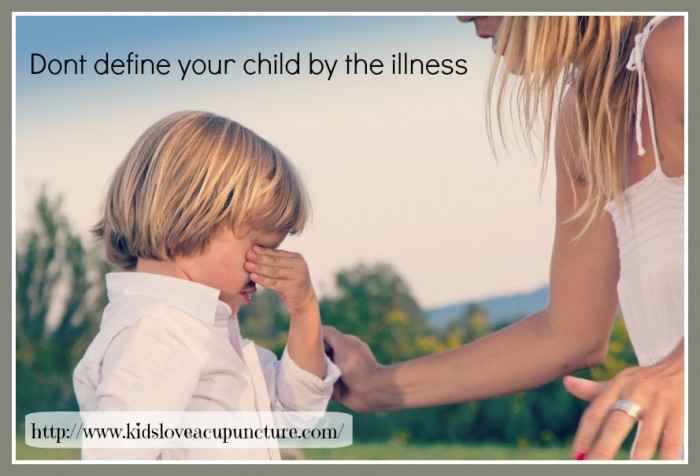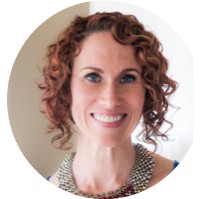
Many parents who step into my clinic have a child with a chronic illness. I've seen first hand how worry, doubt, guilt, fear, and anxiety about their child's illness can build up and subconsciously define how the parent sees their child. I've also had this experience myself when my first born came down with a severe chronic case of eczema. It's easy to let the feelings of guilt and anxiety overwhelm you (see my personal post Letting of of Mommy Guilt), but the problem is these thoughts create negative energy that our children easily pick up on, eventually changing how the child sees themselves. I'm so excited to share this post from my dear friend—body-centered coach/psychotherapist Dawn Gibson. Not only is she an expert at helping her clients work through anxiety, guilt, and fear but she's also been there herself. Her daughter has asthma and she shares her wisdom of how she avoids letting it define her daughter. My hope is that this article will inspire to you let go of emotions that don't serve you or your child and help your child see how amazing they are even with their illness.
Let Go of Guilt and Anxiety: Avoid Defining Your Child by Their Disease
When you have a child who has been diagnosed with a medical issue, whether it is asthma, autism, gastrointestinal problems, eczema, or food allergies your emotions may switch into overdrive: · You might feel scared or worried about his health and well-being. What kind of life will he have if he has to battle this issue for the rest of his life? · Your imagination might run wild with scenarios of what could happen if he eats something he’s allergic to or comes into contact with something that causes his asthma to get out of control. You may become obsessed with keeping him safe. · You also might begin to feel guilty and wonder what you did to cause this problem. You might ask yourself, “Was it the fast food I ate that day while I was pregnant? Was it the medication I took when I was feeling depressed?” · You might feel angry. “Why ME? Why HIM?” · You might even feel sad and powerless, as if you have no control over what’s happening to your child and that there is no way out of this situation—you and he are stuck.
I know you love your child. I know you want what’s best for her.
Please know that there is nothing WRONG with your child. You didn’t DO this to her, so please offer yourself some compassion for doing the best you can in this new and scary situation. As a parent, you might have the tendency to focus on what is wrong with your child and how to “fix” her or make her better. You may begin to focus on her “problem” and lose sight of who she is. When you make your child’s disease about her, you unintentionally create the belief for her that she IS her disease. Despite meaning well and simply wanting to protect her, this may be what she ends up learning from you. As she grows, she starts to believe your story—that she isn’t “normal,” she can’t do the same things as the other children, and the world is unsafe so she needs to be protected. Who can blame you? You’re scared and you’re doing what most parents would do in your situation. By making her disease about her, you’re sending the message that her potential is limited and there is lack in her life—lack of food, lack of fun, lack of sports, lack of freedom, lack of expansion, or lack of opportunity. When you live in fear, worry, or guilt, you create this worry and fear for your child and inevitably, whether you voice these concerns aloud or not, he will feel them and will carry them on as if they are his own feelings and thoughts. He will become confused and won’t be able to decipher who he truly is because he will be living out YOUR story and beliefs about what’s possible for him as he lives with this disease throughout his life. He will accept the fear-based stories that he’s learning from you, so he won’t feel empowered or be given the chance to create his own powerful and limitless stories and beliefs about himself.
Our children look to us to make sense of the world.
They look to us to learn whether the world is safe or unsafe, whether they are worthy or unworthy. When you take a moment to calm your anxiety and guilt related to your child, you will be able to see his essence more clearly. You will be able to see past his behaviors and disease (whether he has autism, bowel issues, or whatever the problem) and you can see his truth—the highest version of who he is. Once you see who he truly is, you can then guide him in his life based on his truth, rather than guiding him through life based on his disease. I know that you want what is best for your child. You want him to be well and to live a “normal” life. Maybe it’s time to redefine “normal.” No matter what your child’s issues are, creating the life that she deserves to live starts with you. It starts when you begin to take a look at yourself, your own patterns, issues, and beliefs that give you this unconscious limited way of viewing your child. It starts with your willingness to shift your perception of her and her illness. It’s scary, I know! I also know that it’s possible. Do it for yourself. Do it for your child.
Here are a couple of tools to start you on the journey of creating the life you want for your child and yourself:
1. When you begin to feel anxious, sad, or angry, stop, take 3 deep breaths, and check in with your body. What sensations do you notice? Is your chest, stomach, or throat tight? Do you feel tingly on the left side of your body? Where are you carrying this feeling? Once you notice the physical sensation, simply stay with it and continue to breathe. The feeling within your body should dissipate within 1-2 minutes. Many people attempt to “numb out” or run away from big feelings. I’m asking you to go into that feeling to help you shift quickly, rather than bury them.—they will still come out in some way, shape or form if you attempt to avoid them. 2. When your child is playing, I want you observe him or her. See what lights her up. What excites him? Now delight in her by acknowledging your child. Once you notice what excites him, think of ways you can guide your child. How can you take his love of building and creating, or her love of singing and dancing and magnify it in his or her life? Where can you help expand this joy and passion? Now do it! 3. Consider the words and tone you use when discussing your child’s disease with him, her, or others in your life. Words matter and they do have power. The words we use help our children form their perception of their issues and the world around them. Rather than speaking about your child’s issues as if you feel sorry for him (and creating the victim mentality) or as if the illness is an obstacle in her life (she may begin to feel resentful, controlled, or confined), choose your words and tone carefully no matter with whom you are speaking.
My daughter has asthma.
It is controlled now, and she is allergic to 30 plants and foods that trigger an attack. Although we will never own a dog or have a cat inside, she doesn’t feel that her asthma defines her or controls her life. When I talk about her asthma, I use factual information and help her see it as something that we just need to be aware of rather than making it “the” thing in her life. Caring for a child with a medical issue, especially if it is life-threatening, is scary. Please be compassionate with yourself and know that you have done the best that you can in helping your child. If you’re concerned that you haven’t managed your anxiety well or feel you have disempowered your child during this time, recalibrate by starting right now with the tools I’ve offered to you. You can help your child see that the issue she has is only one part of her life, not that the issue IS her life! With Love and Consciousness, Dawn K. Gibson, LCSW
Woman Ignited: Heal deeply, shift unwanted patterns, embody confidence to create your happy life begins on August 13, 2014 and is unique in that you will also receive powerful body-centered private sessions with her. If you are ready to feel more confident and shift patterns you're tired of repeating, then contact Dawn directly at: dawn@dawnkgibson.com so she can send you the invitation page or schedule a complimentary session to explore working together.
 Dawn K. Gibson, LCSW is a Personal Development Coach for moms. She utilizes powerful and effective body-centered coaching to help moms eliminate chaos, heal trauma, and break patterns that they’re sick and tired of repeating, so they don’t pass them down to their own children. You can learn more about her and her work at Dawn K. Gibson.
Dawn K. Gibson, LCSW is a Personal Development Coach for moms. She utilizes powerful and effective body-centered coaching to help moms eliminate chaos, heal trauma, and break patterns that they’re sick and tired of repeating, so they don’t pass them down to their own children. You can learn more about her and her work at Dawn K. Gibson.
This post was featured on:
Thank Goodness it's Monday by Nourishingjoy.com
Simple Lives Thursday by Homespunoasis.com
Old Fashioned Friday by Ourheritageofhealth.com
Natural Family Friday by Naturalfamilytoday.com
Unprocessed Fridays by Girlmeetsnourishment.com
Lets Get Real Friday Party by Jugglingrealfoodandreallife.com
Simply Natural Saturday by Thepistachioproject.com


Comments